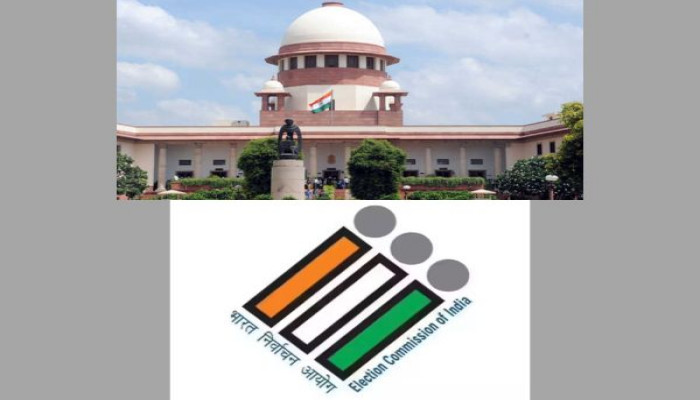Supreme Court allows Bihar voter list revision, questions timing and Aadhaar exclusion
- In Reports
- 05:35 PM, Jul 10, 2025
- Myind Staff
The Supreme Court on Thursday permitted the Election Commission of India to go ahead with its Special Intensive Revision of electoral rolls in Bihar, calling the process a “constitutional mandate”.
A bench comprising Justices Sudhanshu Dhulia and Joymalya Bagchi did question the timing of the revision and also expressed a preliminary view that Aadhaar card, voter ID card, and ration card could be used during the revision in Bihar.
“We are of the prima facie view that Aadhaar cards, Voter ID cards and the Ration cards be allowed in the special intensive revision of electoral rolls,” the bench said.
The court observed that none of the petitioners, including leaders from ten opposition parties, had requested an interim stay on the Election Commission’s activity, and it asked for a response on the group of petitions and scheduled the hearing for July 28.
The court instructed the Election Commission to file its counter affidavit by July 21, while replies to those counter affidavits should be submitted by July 28.
The bench clarified that it did not doubt the integrity or dedication of the Election Commission in carrying out the exercise, which it described as a constitutional duty, but it said that the timing of the process had raised concerns.
“We are not doubting your sincerity but there are perceptions. We are not thinking of stopping you because it is a constitutional mandate,” the bench told senior advocate Rakesh Dwivedi, who represented the Election Commission.
Dwivedi informed the court that 60 percent of voters had already verified their details and assured that no names would be removed from the voter list without first giving the person a chance to respond.
“We cannot stop a constitutional body from doing what it is supposed to do. Simultaneously, we will not let them do what they are not supposed to do,” the bench said.
Earlier in the day, the bench had raised questions over the timing of the special revision exercise in poll-bound Bihar and stated that the matter touches the “root of democracy and power to vote” while rejecting the argument that the Election Commission lacked the authority to conduct it.
The Election Commission defended its actions and said that Aadhaar is not considered a “proof of citizenship”.
The bench also questioned Dwivedi about why the Aadhaar card was being excluded from the special revision in Bihar and said that the Election Commission had no role in verifying a person’s citizenship, which falls under the Ministry of Home Affairs.
In response, Dwivedi referred to Article 326 of the Constitution and stated that only Indian citizens are allowed to vote and that “Aadhaar card is not proof of citizenship”.
Justice Dhulia remarked, “If you are to check citizenship under SIR of electoral rolls in Bihar, then you should have acted early, it is a bit late.”
The bench also dismissed the argument made by the petitioners’ counsel that the Election Commission had no authority to carry out such an exercise in Bihar and pointed out that this process was already mentioned in the Constitution and that the last such revision was carried out in 2003.
While addressing the claims made by the petitioners, the bench said the Election Commission would need to respond to three key questions since the revision effort in Bihar is linked to the “root of democracy and power to vote”.
The petitioners, who include political leaders as well as civil society members and organisations, have raised concerns about the Election Commission’s authority to conduct such a revision and the timing of the move.
Dwivedi argued that over time, the voter list needs updates to add or remove names and said that the special intensive revision was one such method to carry out this task.
He questioned that if the Election Commission did not have the power to revise the voter list, then who else would have it. However, the poll panel also assured the court that no voter would be excluded from the list without being given a chance to explain.
At the beginning of the hearing, senior advocate Gopal Sankaranarayanan, representing the NGO ‘Association for Democratic Reforms’, stated that the revision of electoral rolls can be done under the Representation of People Act.
He informed the court that the entire revision would cover around 7.9 crore citizens and that even voter ID cards and Aadhaar cards were not being accepted at the moment.
More than ten petitions have been filed in the Supreme Court, with the lead petitioner being the NGO ‘Association for Democratic Reforms’.
Other petitioners include RJD MP Manoj Jha, Trinamool Congress MP Mahua Moitra, Congress leader K C Venugopal, NCP (SP) leader Supriya Sule, CPI leader D Raja, Samajwadi Party’s Harinder Singh Malik, Shiv Sena (UBT) leader Arvind Sawant, JMM’s Sarfraz Ahmed, and CPI (ML)’s Dipankar Bhattacharya, all of whom have approached the top court seeking cancellation of the Election Commission’s order.







Comments